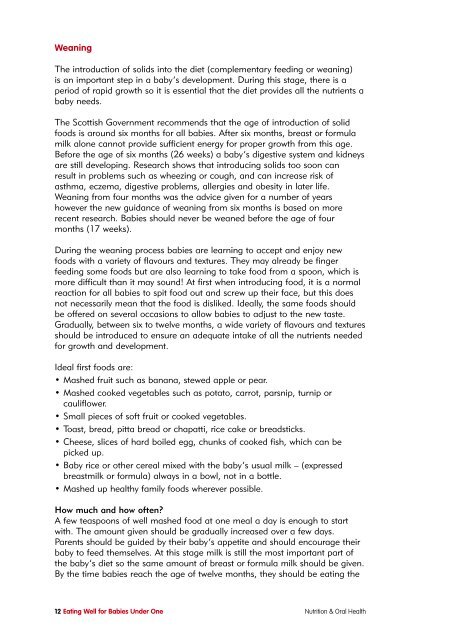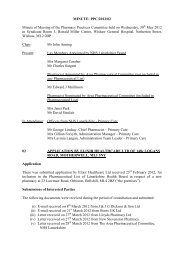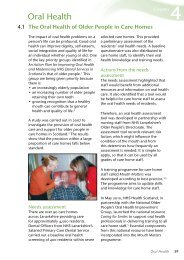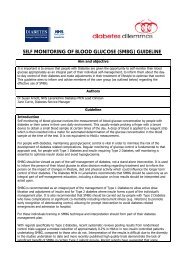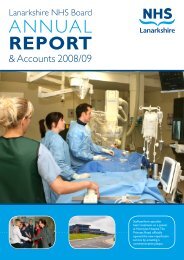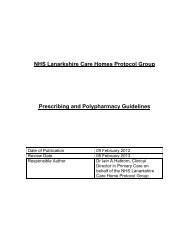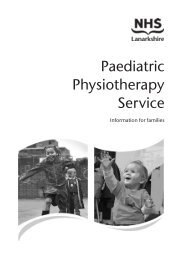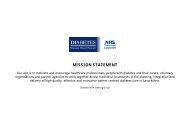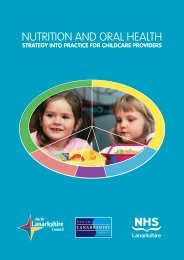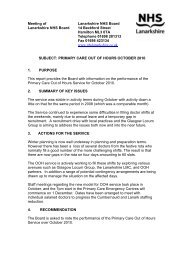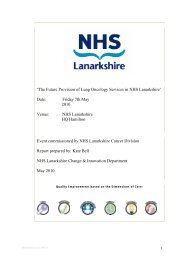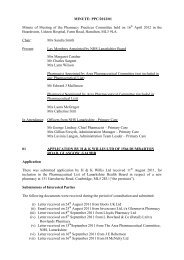Nutrition and Oral Health - NHS Lanarkshire
Nutrition and Oral Health - NHS Lanarkshire
Nutrition and Oral Health - NHS Lanarkshire
Create successful ePaper yourself
Turn your PDF publications into a flip-book with our unique Google optimized e-Paper software.
Weaning<br />
The introduction of solids into the diet (complementary feeding or weaning)<br />
is an important step in a baby’s development. During this stage, there is a<br />
period of rapid growth so it is essential that the diet provides all the nutrients a<br />
baby needs.<br />
The Scottish Government recommends that the age of introduction of solid<br />
foods is around six months for all babies. After six months, breast or formula<br />
milk alone cannot provide sufficient energy for proper growth from this age.<br />
Before the age of six months (26 weeks) a baby’s digestive system <strong>and</strong> kidneys<br />
are still developing. Research shows that introducing solids too soon can<br />
result in problems such as wheezing or cough, <strong>and</strong> can increase risk of<br />
asthma, eczema, digestive problems, allergies <strong>and</strong> obesity in later life.<br />
Weaning from four months was the advice given for a number of years<br />
however the new guidance of weaning from six months is based on more<br />
recent research. Babies should never be weaned before the age of four<br />
months (17 weeks).<br />
During the weaning process babies are learning to accept <strong>and</strong> enjoy new<br />
foods with a variety of flavours <strong>and</strong> textures. They may already be finger<br />
feeding some foods but are also learning to take food from a spoon, which is<br />
more difficult than it may sound! At first when introducing food, it is a normal<br />
reaction for all babies to spit food out <strong>and</strong> screw up their face, but this does<br />
not necessarily mean that the food is disliked. Ideally, the same foods should<br />
be offered on several occasions to allow babies to adjust to the new taste.<br />
Gradually, between six to twelve months, a wide variety of flavours <strong>and</strong> textures<br />
should be introduced to ensure an adequate intake of all the nutrients needed<br />
for growth <strong>and</strong> development.<br />
Ideal first foods are:<br />
• Mashed fruit such as banana, stewed apple or pear.<br />
• Mashed cooked vegetables such as potato, carrot, parsnip, turnip or<br />
cauliflower.<br />
• Small pieces of soft fruit or cooked vegetables.<br />
• Toast, bread, pitta bread or chapatti, rice cake or breadsticks.<br />
• Cheese, slices of hard boiled egg, chunks of cooked fish, which can be<br />
picked up.<br />
• Baby rice or other cereal mixed with the baby’s usual milk – (expressed<br />
breastmilk or formula) always in a bowl, not in a bottle.<br />
• Mashed up healthy family foods wherever possible.<br />
How much <strong>and</strong> how often?<br />
A few teaspoons of well mashed food at one meal a day is enough to start<br />
with. The amount given should be gradually increased over a few days.<br />
Parents should be guided by their baby’s appetite <strong>and</strong> should encourage their<br />
baby to feed themselves. At this stage milk is still the most important part of<br />
the baby’s diet so the same amount of breast or formula milk should be given.<br />
By the time babies reach the age of twelve months, they should be eating the<br />
12 Eating Well for Babies Under One <strong>Nutrition</strong> & <strong>Oral</strong> <strong>Health</strong>


